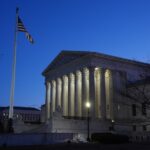
Authored by Kevin Stocklin via The Epoch Times (emphasis ours),
One problem for CEOs who direct their companies to follow the goals of environmental, social, and governance (ESG) criteria is that in doing so, they may be breaking the law. According to legal experts, ESG initiatives can cause companies to break antitrust, civil rights, and Employee Retirement Income Security Agency (ERISA) laws.
“The way ESG is being implemented is completely antidemocratic, which is to say that they are just flouting laws,” George Mason University law professor Todd Zywicki told The Epoch Times. “They’re flouting democratically elected laws and bringing things about that are often illegal.”

Violation of Antitrust Laws
According to a report titled “Liability Risks for the ESG Agenda” (pdf), by Washington D.C. law firm Boyden Gray, companies that take part in coordinated actions against other companies or industries could be violating U.S. antitrust laws. The report states, “Federal law prohibits companies from colluding on group boycotts or conspiring to restrain trade, even to advance political or social goals.”
It cites the Sherman Act of 1890, which prohibits “every contract, combination … or conspiracy in restraint of trade or commerce.” Supreme Court Justice Thurgood Marshall wrote on this subject, commenting that “antitrust laws in general, and the Sherman Act in particular, are the Magna Carta of free enterprise. They are as important to the preservation of economic freedom and our free-enterprise system as the Bill of Rights is to the protection of our fundamental personal freedoms.”
Hundreds of the world’s largest corporations have signed joint pledges through international clubs such as Climate Action 100+, the Glasgow Financial Alliance for Net Zero (GFANZ), the Net Zero Banking Alliance, the Net Zero Asset Managers Alliance, and others to reduce the use of fossil fuels.
GFANZ, which includes 550 global corporations as members, states that “all members have independently committed to the goal of net zero by 2050, in addition to setting interim targets for 2030 or earlier and reporting transparently on progress along the way.” GFANZ banking members include Bank of America, Citibank, JPMorgan Chase, Wells Fargo, BlackRock, Morgan Stanley, and Goldman Sachs.
Climate Action 100+ includes 700 investment companies representing $68 trillion in assets; it also includes 166 companies with a combined market capitalization more than $10 trillion. Among the hundreds of members of Climate Action 100+ are some of the world’s largest and most powerful companies, including Boeing, BP, Caterpillar, Chevron, Dow, Exxon, Ford, Honda, Lockheed Martin, Mercedes, Nestle, Nissan, PepsiCo, Proctor & Gamble, Raytheon, Siemens, Coca Cola, Toyota, United Airlines, American Airlines, Walmart, BlackRock, State Street, Goldman Sachs, Fidelity, PIMCO, and Allianz. It also includes America’s largest state pension funds, such as CalPERS, CalSTRS, New York City Pension Funds, and New York State Common Retirement Fund.
The Boyden Gray report notes that the argument that ESG advocates make—that companies which follow ESG guidelines are better investments —“relies heavily on bandwagon effects.” In other words, if enough asset managers collaborate to shift their investments toward ESG-compliant companies, the shares of those companies become more valuable; and even more so if governments subsidize industries like wind and solar, while punishing fossil fuel companies.
Violation of Civil Rights Laws
Beyond antitrust, another area where ESG may run afoul of America’s laws is where the push for racial and gender equity violates the Civil Rights Act of 1964, which prohibits discrimination on the basis of race, color, sex, religion, or national origin. In step with ESG social justice goals, United Airlines announced in April 2021 that it would set racial and gender quotas when hiring pilots.
The company stated that “our flight deck should reflect the diverse group of people on board our planes every day. That’s why we plan for 50 percent of the 5,000 pilots we train in the next decade to be women or people of color.”
A number of recent court rulings have underscored the validity of U.S. laws regarding racial discrimination. In June 2021, a federal judge ruled that the Biden administration’s farming grants, which gave preference to racial minorities, were illegal. In a separate case, the courts ruled that COVID-relief grants by the Biden administration that excluded white restaurant owners were also illegal.
But America’s civil rights laws go beyond government policy to include private industry as well, opening companies up to lawsuits from employees. In August, for example, American Express became the latest company to face an employee lawsuit for racial discrimination. Brian Netzel, a decade-long employee who was fired in 2020 on what he claims are racial grounds, stated in his class-action lawsuit that American Express “gave preferential treatment to individuals for being black and unambiguously signaled to white employees that their race was an impediment to getting ahead in the company.”
In October 2021, a white male employee was awarded $10 million by a jury that agreed with his claim that he was fired as part of a race-based policy by his employer, Novant Health. After five years of positive work reviews, David Duvall was fired “without warning or cause as part of an intentional campaign to promote diversity in its management ranks; a campaign [Novant] has boasted about publicly,” his suit stated.
“It’s been well known for decades that quotas are illegal,” Zywicki said. “But when you start looking at things like racial sensitivity training, they’re engaging pretty much in rampant stereotyping, negative stereotyping of certain groups, and they are engaging in rampant preferences for others. All of this runs pretty clearly up against existing civil rights laws.”
Diversity, Equity, and Inclusion (DEI) programs, a component of ESG, are coming under fire, both as mandatory employee training and as hiring criteria.
It was reported on Nov. 2 that University of North Carolina’s School of Medicine “forces applicants, students, and professors to constantly prove their commitment to the tenets of diversity, equity, and inclusion as a prerequisite to advancement, rather than basing such decisions on merit alone.” This was based on a report by a nonprofit called Do No Harm, which charged that one of UNC’s main criteria for hiring and promotion of teachers was “a positive contribution to DEI efforts.”
Stanley Goldfarb, the chairman of Do No Harm, stated in a letter to the school that “it is inappropriate to require that candidates for promotion and tenure demonstrate their commitment to a political ideology. Forcing candidates to declare their support for DEI when many undoubtedly oppose it would compel dishonesty.” This report comes amid a case before the U.S. Supreme Court wherein UNC was charged with having unconstitutional race-based admission standards.
Violation of Fiduciary Laws
A third area where ESG clashes with U.S. law regards the legal obligation of fund managers and corporate executives to act in good faith and in the best interests of investors and shareholders.
The Employee Retirement Income Security Act, passed in 1974 to address corruption and misuse of pension money, requires that private pension fund managers invest “solely in the interests of participants and beneficiaries.” It set what is called a “prudent expert” standard of care for fund managers and allows fund beneficiaries to sue managers for failing to uphold this standard.
While ERISA applies to corporate pension funds, many U.S. states have applied similar language to public pension funds. Currently, 24 states forbid ideological investing for their public pension funds, including ESG.
An August letter to BlackRock, signed by 19 state attorneys general, for example, charged that BlackRock had a “duty of loyalty” to state pensioners who invested in its funds and that “your actions around promoting net zero, the Paris Agreement, or taking action on climate change indicate rampant violations of this duty, otherwise known as acting with ‘mixed motives.’”
In response, BlackRock wrote that “one of [its] most critical tasks as a fiduciary investor for our clients is to identify short- and long-term trends in the global economy that may affect our clients’ investments.” The letter states that “governments representing over 90 percent of global GDP have committed to move to net-zero in the coming decades. We believe investors and companies that take a forward-looking position with respect to climate risk … will generate better long-term financial outcomes.”
State attorneys general disagreed, stating that despite climate-change rhetoric, “governments are not implementing policies to require net zero … In particular, the United States has not implemented net-zero mandates. Despite doing everything in his power at the beginning of his presidency to shut down fossil fuels, even President Biden is appearing to reverse course given the harm his inflationary policies have inflicted on the American people.”
In October, Swiss bank UBS downgraded the shares of BlackRock, stating that “as [BlackRock’s] performance deteriorates and political risk from ESG has increased, we believe the potential for lost fund mandates and regulatory scrutiny has recently increased.”
In addition to the risk that ESG asset managers violate their fiduciary duty to investors, there is also the risk that corporate managers violate their duty to act in the best interest of the shareholders of the company.
Read more here...
Authored by Kevin Stocklin via The Epoch Times (emphasis ours),
One problem for CEOs who direct their companies to follow the goals of environmental, social, and governance (ESG) criteria is that in doing so, they may be breaking the law. According to legal experts, ESG initiatives can cause companies to break antitrust, civil rights, and Employee Retirement Income Security Agency (ERISA) laws.
“The way ESG is being implemented is completely antidemocratic, which is to say that they are just flouting laws,” George Mason University law professor Todd Zywicki told The Epoch Times. “They’re flouting democratically elected laws and bringing things about that are often illegal.”

Violation of Antitrust Laws
According to a report titled “Liability Risks for the ESG Agenda” (pdf), by Washington D.C. law firm Boyden Gray, companies that take part in coordinated actions against other companies or industries could be violating U.S. antitrust laws. The report states, “Federal law prohibits companies from colluding on group boycotts or conspiring to restrain trade, even to advance political or social goals.”
It cites the Sherman Act of 1890, which prohibits “every contract, combination … or conspiracy in restraint of trade or commerce.” Supreme Court Justice Thurgood Marshall wrote on this subject, commenting that “antitrust laws in general, and the Sherman Act in particular, are the Magna Carta of free enterprise. They are as important to the preservation of economic freedom and our free-enterprise system as the Bill of Rights is to the protection of our fundamental personal freedoms.”
Hundreds of the world’s largest corporations have signed joint pledges through international clubs such as Climate Action 100+, the Glasgow Financial Alliance for Net Zero (GFANZ), the Net Zero Banking Alliance, the Net Zero Asset Managers Alliance, and others to reduce the use of fossil fuels.
GFANZ, which includes 550 global corporations as members, states that “all members have independently committed to the goal of net zero by 2050, in addition to setting interim targets for 2030 or earlier and reporting transparently on progress along the way.” GFANZ banking members include Bank of America, Citibank, JPMorgan Chase, Wells Fargo, BlackRock, Morgan Stanley, and Goldman Sachs.
Climate Action 100+ includes 700 investment companies representing $68 trillion in assets; it also includes 166 companies with a combined market capitalization more than $10 trillion. Among the hundreds of members of Climate Action 100+ are some of the world’s largest and most powerful companies, including Boeing, BP, Caterpillar, Chevron, Dow, Exxon, Ford, Honda, Lockheed Martin, Mercedes, Nestle, Nissan, PepsiCo, Proctor & Gamble, Raytheon, Siemens, Coca Cola, Toyota, United Airlines, American Airlines, Walmart, BlackRock, State Street, Goldman Sachs, Fidelity, PIMCO, and Allianz. It also includes America’s largest state pension funds, such as CalPERS, CalSTRS, New York City Pension Funds, and New York State Common Retirement Fund.
The Boyden Gray report notes that the argument that ESG advocates make—that companies which follow ESG guidelines are better investments —“relies heavily on bandwagon effects.” In other words, if enough asset managers collaborate to shift their investments toward ESG-compliant companies, the shares of those companies become more valuable; and even more so if governments subsidize industries like wind and solar, while punishing fossil fuel companies.
Violation of Civil Rights Laws
Beyond antitrust, another area where ESG may run afoul of America’s laws is where the push for racial and gender equity violates the Civil Rights Act of 1964, which prohibits discrimination on the basis of race, color, sex, religion, or national origin. In step with ESG social justice goals, United Airlines announced in April 2021 that it would set racial and gender quotas when hiring pilots.
The company stated that “our flight deck should reflect the diverse group of people on board our planes every day. That’s why we plan for 50 percent of the 5,000 pilots we train in the next decade to be women or people of color.”
A number of recent court rulings have underscored the validity of U.S. laws regarding racial discrimination. In June 2021, a federal judge ruled that the Biden administration’s farming grants, which gave preference to racial minorities, were illegal. In a separate case, the courts ruled that COVID-relief grants by the Biden administration that excluded white restaurant owners were also illegal.
But America’s civil rights laws go beyond government policy to include private industry as well, opening companies up to lawsuits from employees. In August, for example, American Express became the latest company to face an employee lawsuit for racial discrimination. Brian Netzel, a decade-long employee who was fired in 2020 on what he claims are racial grounds, stated in his class-action lawsuit that American Express “gave preferential treatment to individuals for being black and unambiguously signaled to white employees that their race was an impediment to getting ahead in the company.”
In October 2021, a white male employee was awarded $10 million by a jury that agreed with his claim that he was fired as part of a race-based policy by his employer, Novant Health. After five years of positive work reviews, David Duvall was fired “without warning or cause as part of an intentional campaign to promote diversity in its management ranks; a campaign [Novant] has boasted about publicly,” his suit stated.
“It’s been well known for decades that quotas are illegal,” Zywicki said. “But when you start looking at things like racial sensitivity training, they’re engaging pretty much in rampant stereotyping, negative stereotyping of certain groups, and they are engaging in rampant preferences for others. All of this runs pretty clearly up against existing civil rights laws.”
Diversity, Equity, and Inclusion (DEI) programs, a component of ESG, are coming under fire, both as mandatory employee training and as hiring criteria.
It was reported on Nov. 2 that University of North Carolina’s School of Medicine “forces applicants, students, and professors to constantly prove their commitment to the tenets of diversity, equity, and inclusion as a prerequisite to advancement, rather than basing such decisions on merit alone.” This was based on a report by a nonprofit called Do No Harm, which charged that one of UNC’s main criteria for hiring and promotion of teachers was “a positive contribution to DEI efforts.”
Stanley Goldfarb, the chairman of Do No Harm, stated in a letter to the school that “it is inappropriate to require that candidates for promotion and tenure demonstrate their commitment to a political ideology. Forcing candidates to declare their support for DEI when many undoubtedly oppose it would compel dishonesty.” This report comes amid a case before the U.S. Supreme Court wherein UNC was charged with having unconstitutional race-based admission standards.
Violation of Fiduciary Laws
A third area where ESG clashes with U.S. law regards the legal obligation of fund managers and corporate executives to act in good faith and in the best interests of investors and shareholders.
The Employee Retirement Income Security Act, passed in 1974 to address corruption and misuse of pension money, requires that private pension fund managers invest “solely in the interests of participants and beneficiaries.” It set what is called a “prudent expert” standard of care for fund managers and allows fund beneficiaries to sue managers for failing to uphold this standard.
While ERISA applies to corporate pension funds, many U.S. states have applied similar language to public pension funds. Currently, 24 states forbid ideological investing for their public pension funds, including ESG.
An August letter to BlackRock, signed by 19 state attorneys general, for example, charged that BlackRock had a “duty of loyalty” to state pensioners who invested in its funds and that “your actions around promoting net zero, the Paris Agreement, or taking action on climate change indicate rampant violations of this duty, otherwise known as acting with ‘mixed motives.’”
In response, BlackRock wrote that “one of [its] most critical tasks as a fiduciary investor for our clients is to identify short- and long-term trends in the global economy that may affect our clients’ investments.” The letter states that “governments representing over 90 percent of global GDP have committed to move to net-zero in the coming decades. We believe investors and companies that take a forward-looking position with respect to climate risk … will generate better long-term financial outcomes.”
State attorneys general disagreed, stating that despite climate-change rhetoric, “governments are not implementing policies to require net zero … In particular, the United States has not implemented net-zero mandates. Despite doing everything in his power at the beginning of his presidency to shut down fossil fuels, even President Biden is appearing to reverse course given the harm his inflationary policies have inflicted on the American people.”
In October, Swiss bank UBS downgraded the shares of BlackRock, stating that “as [BlackRock’s] performance deteriorates and political risk from ESG has increased, we believe the potential for lost fund mandates and regulatory scrutiny has recently increased.”
In addition to the risk that ESG asset managers violate their fiduciary duty to investors, there is also the risk that corporate managers violate their duty to act in the best interest of the shareholders of the company.
Read more here…






